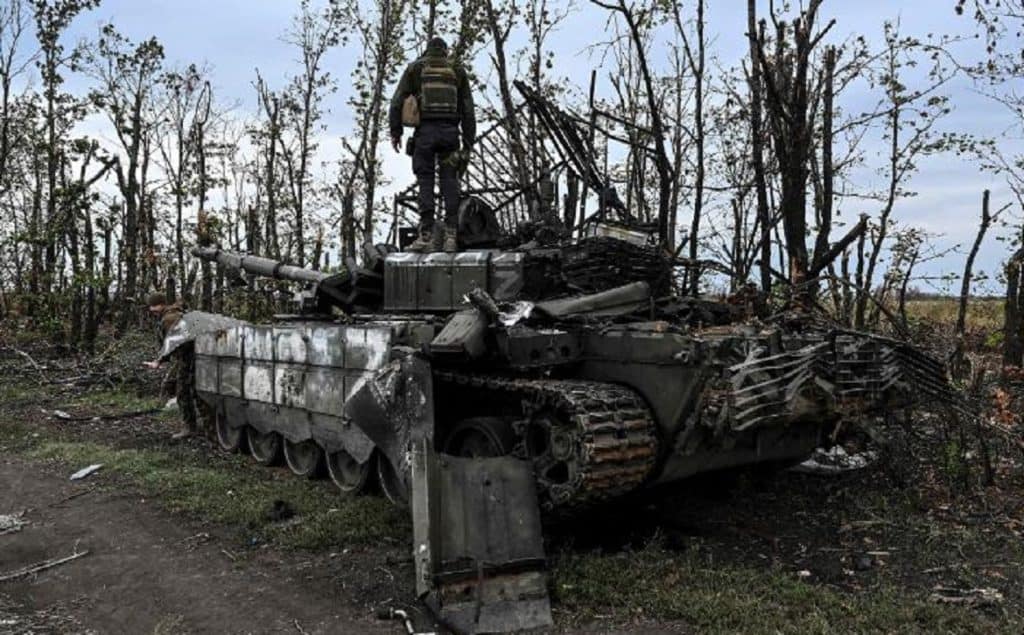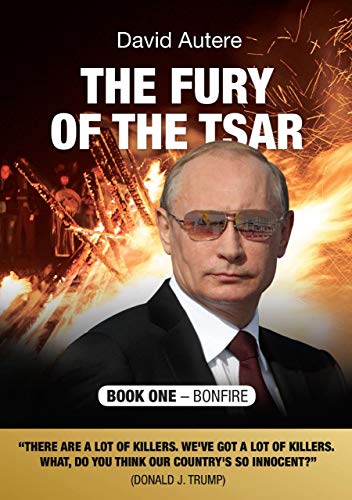World Geostrategic Interview with Dr. Attila Demkó on the shortcomings of the Russian military in Ukraine, the discontent of the Russian pro-war camp, the long-term sustainability of Western economic and military support to Ukraine, and Hungary’s position on the conflict in Ukraine.

Dr. Attila Demkó is the Head of the Centre for Geopolitics at Mathias Corvinus Collegium- MCC, Hungary, and a former advisor to the Hungarian NATO mission and Ministry of Defence. He is a writer and the author of the “Fury of the Tsar”, a book that gives an exclusive insight into Vladimir Putin’s mindset.
Q1 – In September, the Ukrainian counteroffensive surprised Russia in the southern front around Kherson and on the eastern front, recapturing territory in the Kharkiv region. Russian forces still control about one-fifth of Ukrainian territory in the south and east of the country, but Kiev is on the offensive in both areas, and Ukrainian troops have already recaptured dozens of towns in what appears to be a stunning turnaround on the battlefield. Undoubtedly, the counteroffensive has dealt a blow to Moscow’s military prestige, and even Russian-appointed officials in occupied Ukrainian cities have acknowledged some defeat. What are the factors behind the recent Russian military setback and the progress of Ukrainian forces? Has the situation changed after the United States provided Ukraine with M142 HIMARS – multiple mobile rocket launchers? Can we consider the Russian retreat a turning point in the war? Is Russia about to fail in achieving its goals, despite official statements? How do you expect Moscow to respond?
A2 – Russians usually say that they are not fighting with their full force against a mobilised country of 40 million that is supported by the biggest Western military powers. There is some truth in it, but then we can ask the question: why is Russia not mobilising? And here we can see key weaknesses. Moscow did not prepare for a long war, its attacking force was small and had been spread on a large front. It suffered huge losses because of a long list of failures, starting from logistics, leadership, morale but also because of equipment problems. Ukrainian society was ready to fight and to suffer heavy casualties. Ukraine fought back much better than anyone expected, of course with help from the West, but still the major factor was Ukrainian readiness to fight.
While Russian society supports the war in general, it is questionable that they are ready to fight on the frontlines. So Russian numbers, especially infantry were low at the beginning, and comparatively it became lower during the summer as Ukraine mobilised its population. While Russian forces had some successes, these were only tactical breakthroughs. Most of them were minor ones, after the capture of Mariupol. Despite losing territory, Ukraine bought time and today Western support is finally making an impact. The M142 HIMARS is a great tool to attack Russian rear-areas, bridges, ammunition depots, troop concentrations. It was a surprise that supposedly world leading Russian air defence systems could not defend even the most important crossings on the Dnieper River. Thus in Herson Russian logistics became very problematic, and the main strength of Moscow, the artillery, lost some of its power. Still, Herson is less dangerous for Russia than the Kharkiv-Luhansk region. Along the frontline of the Oskil river there is a possibility of a Ukrainian breakthrough that could endanger Luhansk, thus one of the main stated objectives of the Russian war effort.
Q2 – The defeats that followed the Ukrainian counteroffensive-and silence from the Kremlin on what happened on the battlefields- has provoked considerable anger among some pro-war commentators and Russian nationalists, and probably among a significant portion of the Russian public. Even Chechen leader Ramzan Kadyrov, an ally of Russian President Vladimir Putin, has criticised the Russian military, saying that “it is clear that mistakes have been made” and that changes need to be made in the conduct of the military operation. In general, what is your opinion on the Russian military strategy and battle tactics applied in the war in Ukraine? What was wrong? Did Russia really use all its conventional military capabilities?
A2 – Indeed. It is not the first time we see discontent from the Russian pro-war camp, they were truly upset with the failure of the swift encirclement of Severodonenck back in May, but also with other botched operations. Russian nationalists pushed Moscow to hit Ukrainian energy infrastructure harder for months now, and many wanted full mobilisation. These voices only grew louder with the Harkiv defeat.
My opinion that starting this aggression itself is a mistake of strategic proportions for Russia. That is a political mistake, made by President Putin. It is very hard to assess military strategy in the first Kyiv phase of the war without knowing the background deals. Some say that President Putin believed that mass surrender and the escape of President Zelensky will happen in a few hours or days. It seems in the south some Ukrainian forces indeed did not defend the narrow Crimea passes, so there were some sort of deals. But all of this is a guessing game without hard facts. The fact is that the Russian attacking force was too small and was used at too many locations. Russian power was fragmented.
In the second phase Russia concentrated on the Donbass and achieved some success, but again, Russia did not have enough troops to exploit breaches on the front properly. Their main failure was that they could not create large cauldrons like Mariupol. Ukrainian troops withdrew skillfully from Severodonetsk and lived to fight another day. So Russians did not destroy some of the best troops of Ukraine, only pushed them back, and now they are paying for it dearly. Late in the summer Russia mostly employed frontal attacks, like at Pesky. Their artillery just pulverised everything, making the capture of Ukrainian fortresses relatively cheap in terms of Russian infantry losses. The Ukrainian army however lost a large number of troops but had enough reserves to fill all gaps. So, I would say that Russian artillery works, recon UAVs like Orlan-10 work, the Wagner PMC and most of the airborne troops are efficient, but the regular infantry is not really good and simply not numerous enough.
It is hard to tell what will happen, but one thing is sure: Russia is far away from using all of its conventional capabilities. Russian losses are big, more than 3 times the Ukrainian losses in terms of materiel, but most of the lost equipment is replaceable. Manpower is the bigger problem, and I truly wonder how without at least partial mobilisation can Russia fill its depleted ranks.
Of course, Russia can destroy most of the energy infrastructure of Ukraine. The campaign against power plants and dams started after the Harkiv defeat, but it can be much worse, and can hit Ukraine really hard during the winter. Russia can also turn to non-conventional tools, anything is possible.
Q3 – It is clear that Ukraine seems capable of countering the Russian army, but probably only because of intelligence support and weapons supplies from NATO, perhaps underestimated by the Kremlin before the attack. Do you think economic and military support for Ukraine can be sustainable for a long time from the West, and particularly from Europe?
A3 – Indeed, the Kremlin underestimated both Ukrainian and Western resilience. But resilience has its limits, especially in Europe. The lack of resources, particularly natural gas is troubling. A collapsing European economy can be a problem even in a short timescale. What I have just seen in Hungary is very troubling, fertiliser and steel production is in free fall, hundreds of restaurants are closing, as well as spas, theatres, cinemas. And this is only the beginning. As for military support, European countries and the US are in two different leagues. The US has far more of everything, it depends on Washington’s political calculations how far it goes supporting Ukraine. Patriot and longer-range rocket systems or fighter aircraft are probably a red line for Russia. But the weaker party is Europe in both economic and military matters.
Q4 – “Hungary can no longer be considered a democracy, and European values are systematically threatened in the country”, the European Parliament said in a symbolic appeal adopted on Thursday, Sept. 15. What is your opinion on this statement? Can it also be linked to the dissatisfaction of many EU countries with Hungary’s position in the conflict in Ukraine? Hungarian Prime Minister Viktor Orban said recently that the European Union must change its strategy in dealing with the war between Russia and Ukraine and focus on peace talks and drafting peace proposals rather than on winning” and that “it is not possible to destabilise Moscow with sanctions.” What is your opinion?
A4 – Most of the resolution is far from Hungarian realities. This unfortunate step by the EP is only the last of many, to a large degree ideologically motivated attacks. The harmed economic interest of major European firms is also a reason. It is not well known that major German, French etc. owned companies were heavily taxed by the Orban government. When the tax rate of citizens was lowered to 15%, the taxes of these companies went up. To say that the Hungarian government is unpopular with some powerful European business and political circles is an understatement. I’m not saying that Hungary is faultless, corruption is a problem and the government has pledged to improve oversight according to the suggestions of the Commission. Several members of parliament from PM Orban’s had to resign in the last few years and are already in prison, or under investigation, as well as several high level government officials.
But it is highly debatable, that the country is more corrupt than let’s say Croatia, Bulgaria, Slovakia, or Romania. Or, just to mention the most contentious issue, there are differences between the EU mainstream and Hungary about LGBTQ rights. The fact however is, that Hungary is ahead of others in the region, like Romania, Latvia, Lithuania or Bulgaria in terms of rights like registered same sex partnerships, and ahead of several Western European countries in how safe LGBTQ people feel. The situation of the Roma people could be improved, no question. But overall, Hungary is a democracy, not more flawed than many in the Central European region.
So I believe the main reasons are not connected to Ukraine, but the harshness of the criticism is possibly linked to a quite independent Hungarian foreign policy too. That is seen by many as pro Russia. It is not. It may be maverick, but not pro Russia. It is a pro reason. We must examine, what are the real interests of Ukraine? Russia is already selling oil to China and India. The fact is, that Western sanctions against Russia are not followed by much of the world, including the two above mentioned giants. Moscow can reroute most of its exports to Asia, which was proven during the last few months. They may earn less in the long term, but even with a large fall in income, Russia seems to have enough reserves to ride out a year or more. Could Europe survive a full stop of Russian energy for a year? I honestly doubt it. Of course, I was wrong many times before, but based on the information I have, and my team spent quite a time assessing the actual and possible energy sanctions, the Russians are more resilient than we are. So is it in the interest of Ukraine to starve out Europe that is helping its refugees, and also support the Ukrainian economy to stay afloat? We already saw demonstrations in Prague and other cities. What will be the mood by the end of the winter in Europe, if Russian gas stops coming?
Hungary, beyond fully condemning the aggression of Putin, sands by Ukraine with financial and humanitarian help. Almost 1.4 million Ukrainians crossed into Hungary, around 100.000 stayed, and 30.000 applied for temporary protection. Hungarians are in full solidarity with them, and those Ukrainians who are here, know that much of the negative news about Hungary is not true. Humanitarian help is one thing however. To keep our homes warm during the winter is another thing, and for us, dependence on Russian energy is a given, and it will take time to change. If anybody wants to understand Hungary, must understand that we are more dependent on Russian gas than most in the EU.
Dr. Attila Demkó – Head of the Centre for Geopolitics at Mathias Corvinus Collegium- MCC, He is the author ((under the pen name David Autere), of “The Fury of the Tsar”. This book gives an exclusive insight into Vladimir Putin’s mindset. Written in 2019, it reads like a prophecy in 2022: “Vladimir Putin is on the path of revenge, which may dig two graves. The grave of the West, and the grave of Russia”.








